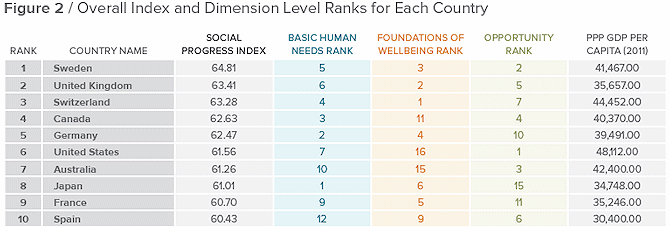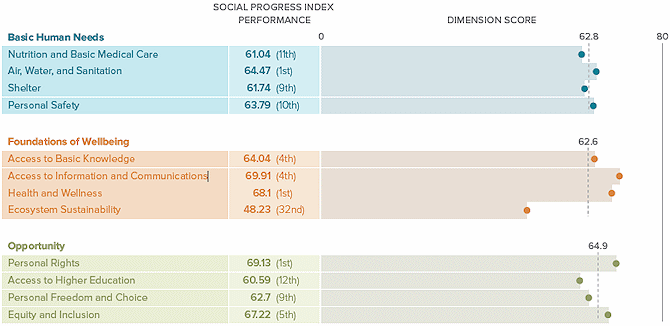Good Broadband Helps UK Rank 2nd in the World for Human Wellbeing
The Social Progress Imperative, a non-profit organisation that works to “advance global human wellbeing“, has released its first Social Progress Index (SPI) that ranks 50 of the world’s leading countries by gauging the quality of their health, communications infrastructure and opportunities. Surprisingly the United Kingdom places 2nd overall.
Social progress is, according to the SPI, defined as the capacity of a society to both meet the basic human needs of its citizens and to give them the opportunity to enhance and sustain the quality of their lives.
Advertisement
In order to measure this, the SPI ranks each country across a variety of areas that have been placed in three distinct categories – Basic Human Needs (air, water, safety etc.), Foundations of Wellbeing (broadband / mobile access, economic sustainability etc.) and Opportunity (education, freedom of speech etc.).
Professor Porter, Author of the SPI, said:
“The ‘Arab Spring’ of 2011 and the challenges in Mexico over the last decade, have illustrated the shortcomings of economic growth as a proxy for social progress. In both business and economic development, our understanding of success has been incomplete.
Previous efforts to go beyond economic measurement alone have laid important groundwork, but we need a more holistic, comprehensive, and rigorous approach. The Social Progress Index is an attempt to address these gaps and opportunities.”
The index ranks Sweden as the “most socially advanced country” globally but this should not distract from the fact that the United Kingdom is only one place behind and ranks 2nd overall. Most interesting of all is that the UK’s strongest single measure is “Access to Information and Communications” (i.e. broadband and mobile services).

In particular it’s worth noting that the Information and Communications (Foundations of Wellbeing) measure looks at, among other things, the estimated number of Internet users out of the total population over the past 12 months. This data comes from the ITU, which in turn gets a lot of its information from the government and Ofcom.
Advertisement
It also factors in the total number of subscriptions per 100 inhabitants (penetration) to “high-speed access to the public Internet“, which is considered to be anything that offers a download speed of 256Kbps (0.25 Megabits per second) or more; hardly a strong measure of internet access quality and performance.
Social Progress Index Scores – United Kingdom

No doubt the pessimistic among you will, perhaps rightly, poke a bit of fun at this one. After all most of us have at one time or another felt incredibly frustrated by our sometimes shaky mobile, transport, education and or internet access infrastructure. On the other hand the optimists may view this as a more realistic reflection of the country, one that its citizens don’t always notice.
Advertisement
Never the less the government will no doubt be jumping for joy at any report that shows the UK in a positive light, although it’s worth remembering that some of the SPI’s measures are extremely limited. For example, it doesn’t so much gauge the quality or performance of our national broadband infrastructure as it does how many people use it.
In related news a new study from Forrester Research has found that UK consumers are “the most connected in Europe“, with 83% going online regularly. Adults are also the most likely to own a device like a laptop (64%), smartphone (52%), or tablet (12%).
Mark is a professional technology writer, IT consultant and computer engineer from Dorset (England), he also founded ISPreview in 1999 and enjoys analysing the latest telecoms and broadband developments. Find me on X (Twitter), Mastodon, Facebook, BlueSky, Threads.net and Linkedin.
« UPDATE Alternative MS3 Ultrafast Fibre Optic Network Goes Live in Hull UK
















































Comments are closed